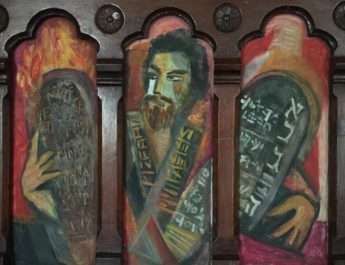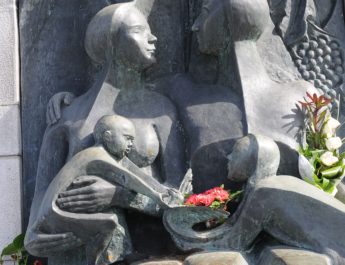Hebrews 2:10-18
First Sunday after Christmas Day A
10 It was fittingA that God,B for whom and through whom all thingsC exist, in bringingD manyE
A “fitting” = prepo. 7x in NT. This is fitting, suitable, conspicuous, proper.
B “God” = autos. Literally, “to him.”
C “all things” = pas. This is all, every.
D “bringing” = ago. This is lead, bring, carry, guide, drive, go.
E “many” = polus. This is much, often, plenteous – a large number or a great extent.
childrenF to glory,G should make the pioneerH
F “children” = huios. This is son, descendant – a son whether natural born or adopted. It can be used figuratively for other forms of kinship.
G “glory” = doxa. From dokeo (to have an opinion, seem, appear, suppose; a personal judgment; to think); from dokos (opinion). This is literally something that evokes a good opinion – something that connects to our understanding of intrinsic worth. The ultimate expression of this is, of course, God and God’s manifestation. So, this is opinion, honor, and dignity, but also praise, glory, renown, and worship.
H “pioneer” = archegos. Related to “bringing” in v10. 4x in NT. From archo (to rule, begin, have first rank or have political power) + hegeomai (to think, suppose, have an opinion; to lead the way, what comes in front or first, initial thought, high esteem or authority; one who commands in an official capacity); {from ago (see note D above)}. This is leader, founder, captain – someone who begins or pioneers a movement with followers.
of their salvationI perfectJ through sufferings.K
I “salvation” = soteria. From soter (a savior, deliverer); from sozo (to save, heal, preserve, or rescue; taking someone from danger to safety; delivering or protecting literally or figuratively); from sos (safe, rescued, well). This is deliverance, salvation, preservation, welfare, prosperity, safety.
J “make…perfect” = teleioo. From teleios (going through the steps to complete a stage or phase and then moving on to the next one; reaching an end and so being complete or “perfect”; also full grown or mature); from telos (an end, aim, purpose, completion, end goal, consummation, tax). This is finish, accomplish, bring to an end, complete, reach a goal, finish a race, to consummate. It refers to completing stages or phases to get to an ultimate conclusion. It can also mean consecrate or fulfill.
K “sufferings” = pathema. 16x in NT. From pathos (passion, lust, suffering, something that happens to you, strong feelings); from pascho (to be acted on for good or ill; often used for negative treatment; properly, feeling strong emotions – especially suffering; can also be the ability to feel suffering). This is something that happens to you such as suffering, affliction, passion, or emotion. It can also be one’s capacity for deep feelings or enduring. Further, it can be hardship or pain.
11 For the oneL who sanctifiesM and those who are sanctified all have one Father. For this reasonN
L “one” = heis. This is one, a person, only, some.
M “sanctifies” = hagiazo. From hagios (sacred, holy, set apart, different other; physically pure, morally blameless, or ceremonially set apart); from hagnos (holy, sacred, pure ethically, ritually, or ceremonially; prepared for worship, chaste, unadulterated, pure to the core; undefiled by sin; figurative for innocent, modest, perfect). This is to make holy, consecrate, sanctify, set apart as holy, purify, venerate.
N “reason” = aitia. From aiteo (to ask, demand, beg, desire). This is a cause or reason. It can also be a legal crime, accusation, guilt, or case.
Jesus is not ashamedO to callP them brothersQ and sisters,
O “ashamed” = epaischunomai. 11x in NT. From epi (on, upon, against, what is fitting) + aischuno to dishonor, put to shame, shrink, disfigure); {from aischos (shame, disgrace, disfigurement)}. This is to be ashamed or disgraced. It is a personal humiliation or dishonor – a shame that matches an error.
P “call” = kaleo. Related to keleuo (to command, order, direct); from kelomai (to urge on). This is to call by name, invite, to name, bid, summon, call aloud.
Q “brothers” = adelphos. From a (with, community, fellowship) + delphus (womb). This is a brother in a literal or figurative sense. It is also used of another member of the Church.
12 saying,
“I will proclaimR your nameS to my brothers and sisters;
in the midstT of the congregationU I will praiseV you.”
R “proclaim” = apaggello. Related to “bringing” and “pioneer” in v10. From apo (from, away from) + aggello (to announce, report); {from aggelos (angel, messenger); probably from ago (see note D above)}. This is to report, declare, bring word. It is an announcement that emphasizes the source.
S “name” = onoma. May be from ginosko (know, recognize, learn from firsthand experience). This is a name, authority, cause, character, fame, reputation. The name was thought to include something of the essence of the person so it was not thought to be separate from the person.
T “midst” = mesos. Perhaps from meta (with among, behind, beyond; implies a change following contact or action). This is middle, among, center, midst.
U “congregation” = ekklesia. Related to “call” in v11. From ek (from, out from) + kaleo (see note P above). This is properly a calling out or an assembly. It was used to refer to a church.
V “praise” = humneo. 4x in NT. From humno (hymn, song to praise God, religious ode; also used in other faiths as songs that celebrated their gods, heroes, etc.); from hudeo (to celebrate). This is singing a hymn or religious ode, to praise or celebrate God.
13 And again,
“I will putW my trustX in him.”
And again,
“HereY am I and the childrenZ whom GodAA has givenBB me.”
W “put” = eimi. This is to be, exist.
X “trust” = peitho. This is to have confidence, to urge, be persuaded, agree, assure, believe, have confidence, trust. It is the root from which the Greek word for faith is drawn (pistis).
Y “here” = idou. From eido (to be aware, see, know, remember, appreciate). This is see! Lo! Behold! Look! Used to express surprise and or draw attention to the statement.
Z “children” = paidion. From pais (child, youth, servant, slave); perhaps from paio (to strike or sting). This is a child as one who is still being educated or trained. Perhaps one seven years old or younger. Used figuratively for an immature Christian.
AA “God” = Theos. From Proto-Indo-European origins, meaning do, put, place. This is God or a god in general.
BB “given” = didomi. To give, offer, place, bestow, deliver. This is give in a literal or figurative sense.
14 Since, therefore, the childrenCC shareDD fleshEE and blood,FF
CC “children” = paidion. Same as “children” in v13. See note Z above.
DD “share” = koinoneo. 8x in NT. From koinonos (partner, companion, partaker, sharer); From koinos (common, shared, unclean, ritually profane); probably from sun (with, together with). This is to contribute, participate, or have a share in. It can also mean to distribute.
EE “flesh” = sarx. May be from saroo (to sweep, cleanse by sweeping); from sairo (to brush off). This is flesh, the body, human nature, materiality, kindred. Flesh is not always evil in scripture (as when it refers to Jesus taking on a human body). However, it is generally used in a negative way for actions made selfishly and not through faith. This can mean animal flesh, i.e. meat, or refer to body in contrast to soul/spirit. Flesh can be a way of talking about how things or people are related or talking about human frailty (physical or moral).
FF “blood” = haima. This is blood in a literal sense as bloodshed. Figuratively, it can also be used to refer to wine or to kinship (being related).
he himself likewiseGG sharedHH the same things, so that through deathII he might destroyJJ
GG “likewise” = paraplesios. 1x in NT. From para (by, close beside) + the same as plesion (near, neighboring, friend). This is similarly or likewise.
HH “shared” = metecho. 8x in NT. From meta (with, among, behind, beyond) + echo (to have, hold, possess). This is to share in, participate, belong, eat or drink, be a member.
II “death” = thanatos. From thnesko (to die, be dead). This is death, whether literal or spiritual. It can also refer to something that is fatal.
JJ “destroy” = katargeo. From kata (down, against, according to, among) + argeo (to delay, linger, be at rest, be idle, do nothing); {from argos (inactive, idle, lazy, thoughtless, useless, unemployed, unprofitable) {from a (not) + ergon (word, task, action, employment)}}. This is making something inactive or bringing it to nothing. So, it could mean making something inoperative or powerless, annulling, or severing. It can also mean to make something ineffective or invalid.
the one who hasKK the powerLL of death, that is,MM the devil,NN
KK “has” = echo. Related to “shared” in v14. See note HH above.
LL “power” = kratos. 12x in NT. This is strength, power, or dominion. It is vigor in a literal or figurative sense or power that is exercised.
MM “is” = eimi. Same as “put” in v13. See note W above.
NN “devil” = diabolos. From diaballo (laying a charge against someone, generally with hostility; literally, to thrust through or cast back and forth– used for slandering, accusing, or gossiping; whether or not the sentiment is true, it is spread with negative intention); {from dia (through, across, because of, thoroughly) + ballo (to throw, cast, place, put, drop)}. This is a properly a slanderer or someone who accuses falsely – criticizing unfairly with the intent to cause harm or damage character. This can also mean backbiter or malicious gossip. Also, the Slanderer, the Devil.
15 and freeOO those who all their livesPP were heldQQ in slaveryRR by the fearSS of death.
OO “free” = apallasso. 3x in NT. From apo (from, away from) + allasso (to change, transform) {from allos (other, another; another of a similar kind or type)}. This is to remove, release, or depart. It can be to free somebody, to settle a case, to heal a disease, or otherwise release.
PP “lives” = zao. This is to live literally or figuratively. It is used for life including the vitality of humans, plants, and animals – it is life physical and spiritual and life everlasting.
QQ “held” = enochos. Related to “shared” and “has” in v14. 10x in NT. From enecho (to hold in, ensnare, be angry at); {from en (in, on, at, by, with) + echo (see note HH above)}. This is bound by, liable to, deserving, guilty, subject, in danger of.
RR “slavery” = douleia. 5x in NT. From douleo (to be a slave, be in bondage, to serve, obey, be devoted; it is to be a slave in a literal or figurative sense); from doulos (a servant or for a slave, enslaved; someone who belongs to someone else; could be voluntary (choosing to be enslaved to pay off debt) or involuntary (captured in war and enslaved)); from deo (to tie, bind, fasten, impel, compel; to declare something against the law or prohibited). This is slavery, bondage, or enslavement in a literal or figurative sense.
SS “fear” = phobos. From phebomai (to flee, withdraw, be put to flight). This is panic flight, fear, fear being caused, terror, alarm, that which causes fear, reverence, respect.
16 For it is clear that he did not come to helpTT angelsUU but the descendantsVV of Abraham.WW
TT “help” = epilambanomai. 19x in NT. From epi (on, upon, against, what is fitting) + lambano (active acceptance/taking of what is available or what has been offered; emphasizes the choice and action of the individual). This is to take hold of, catch, or seize. It can also mean to help. It focuses on the intentionality and resolve of the one doing the catching.
UU “angels” = aggelos. Related to “bringing” and “pioneer” in v10 & “proclaim” in v12. See note R above.
VV “descendants” = sperma. From speiro (to sow seed, spread, scatter); perhaps from spao (to pull, to draw a sword). This is something sown so it could be seed or offspring and descendants. This is where the word “sperm” comes from.
WW “Abraham” = Abraam. From Hebrew Abraham (exalted father); from the same as Abiram (exalted father, a high father – lofty) {from ab (father literal or figurative) + rum (rise, bring up, being high, extol, exalt, haughty; to raise in a literal or figurative sense)}. This is Abraham, father of many nations or father of a multitude.
17 Therefore he had toXX become likeYY his brothers and sisters in every respect,ZZ so that he might becomeAAA
XX “had to” = opheilo. Perhaps from the base of ophelos (advantage, gain, profit); from ophello (heaped together, accumulate, increase). This is to be indebted morally or legally – having an obligation one must meet. This term came from the legal world, but was then adopted in reference to morality. In the New Testament it is used for humanity’s ethical responsibility.
YY “become like” = homoioo.15x in NT. From homoios (similar to, resembling, like); from the same as homou (together); from homos (the same). This is to compare, liken, resemble, become similar.
ZZ “every respect” = pas. Same as “all things” in v10. See note C above.
AAA “become” = ginomai. This is to come into being, to happen, become, be born. It can be to emerge from one state or condition to another or is coming into being with the sense of movement or growth.
a mercifulBBB and faithfulCCC high priestDDD in the service of God,
BBB “merciful” = eleemon. 2x in NT. From eleeo (to have pity on, show mercy to, be compassionate; often used for God’s grace); from eleos (mercy, pity, tender mercy, or compassion; generally understood in action by word or deed). This is merciful or compassionate.
CCC “faithful” = pistos. Related to “trust” in v13. From peitho (see note X above). This is faithful, trustworthy, reliable, sure, or true. It is a fullness of faith. This is the same root as the word “faith” in Greek.
DDD “high priest” = archiereus. Related to “pioneer” in v10. From archo (see note H above) + hiereus (a priest literal or figurative – of any faith); {from hieros (sacred, something sacred, temple, holy, set apart; something consecrated to God or a god)} This is a high or chief priest.
to make a sacrifice of atonementEEE for the sinsFFF of the people.GGG
EEE “make a sacrifice of atonement” = hilaskomai. 2x in NT. From the same as hileos (forgiving, merciful, gracious, cheerful as benevolent; a way to say “far be it”); from hilaos (gracious, benevolent) or from haireomai (to take, choose, or prefer) {probably related to airo (raise, take up, lift, remove)}. This is to make propitiation i.e. a sacrifice of atonement, to be merciful, reconcile, forgive, show favor.
FFF “sins” = hamartia. From hamartano (to miss the mark, do wrong, make a mistake, sin); {from a (not) + meros (a part or share)}. Literally, this means not having one’s share or portion – like not receiving inheritance or what was allotted to you. This word means missing the mark so it is used for guilt, fault, and acts of sin.
GGG “people” = laos. This is the people or crowd – often used for the chosen people. This is where the word “laity” comes from.
18 Because he himself was testedHHH by what he suffered,III he is ableJJJ to helpKKK those who are being tested.
HHH “tested” = peirazo. From peira (trial, experiment, attempt, experience, assaying); from the base of peran (over, beyond, across); akin to pera (on the far side); from a derivative of peiro (to pierce). This is to test, try, tempt, or make proof of. It is to test, scrutinize, or assay something. It could also be examine, entice, prove, or discipline.
III “suffered” = pascho. Related to “sufferings” in v10. See note K above.
JJJ “is able” = dunamai. This is to be able, or something that is possible. It can also be empowered or being powerful. The Greek word for “miracle” (dunamis) comes from this root.
KKK “help” = boetheo. 8x in NT. From boethos (helping or helper; one meeting urgent need); perhaps from boe (to cry, shout for aid; mimics the sound of a desperate shout for help with deep emotion); {from boao (cry out, make a distress call, ask for desperately need assistance); from boe (a cry, shout)} + theo (to run). This is running to help someone who has made an urgent call for help – coming to their rescue. Originally, this was used in a military context, but came to apply more generally to assistance in time of intense distress.
Image credit: “Crucified Christ” by Wassily Kandinsky, 1911.




